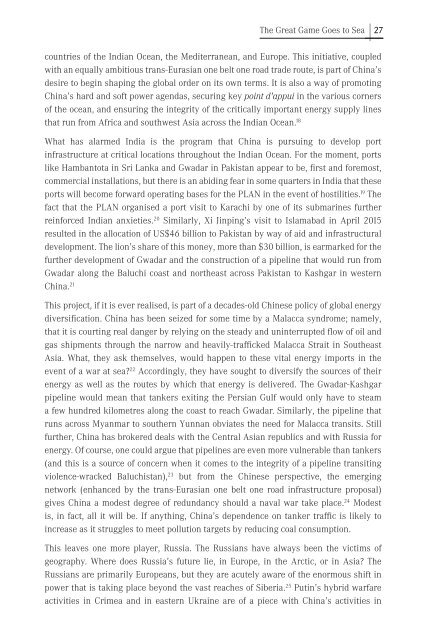THE FUTURE OF SEA POWER
SPC2015_Proceedings
SPC2015_Proceedings
You also want an ePaper? Increase the reach of your titles
YUMPU automatically turns print PDFs into web optimized ePapers that Google loves.
The Great Game Goes to Sea | 27<br />
countries of the Indian Ocean, the Mediterranean, and Europe. This initiative, coupled<br />
with an equally ambitious trans-Eurasian one belt one road trade route, is part of China’s<br />
desire to begin shaping the global order on its own terms. It is also a way of promoting<br />
China’s hard and soft power agendas, securing key point d’appui in the various corners<br />
of the ocean, and ensuring the integrity of the critically important energy supply lines<br />
that run from Africa and southwest Asia across the Indian Ocean. 18<br />
What has alarmed India is the program that China is pursuing to develop port<br />
infrastructure at critical locations throughout the Indian Ocean. For the moment, ports<br />
like Hambantota in Sri Lanka and Gwadar in Pakistan appear to be, first and foremost,<br />
commercial installations, but there is an abiding fear in some quarters in India that these<br />
ports will become forward operating bases for the PLAN in the event of hostilities. 19 The<br />
fact that the PLAN organised a port visit to Karachi by one of its submarines further<br />
reinforced Indian anxieties. 20 Similarly, Xi Jinping’s visit to Islamabad in April 2015<br />
resulted in the allocation of US$46 billion to Pakistan by way of aid and infrastructural<br />
development. The lion’s share of this money, more than $30 billion, is earmarked for the<br />
further development of Gwadar and the construction of a pipeline that would run from<br />
Gwadar along the Baluchi coast and northeast across Pakistan to Kashgar in western<br />
China. 21<br />
This project, if it is ever realised, is part of a decades-old Chinese policy of global energy<br />
diversification. China has been seized for some time by a Malacca syndrome; namely,<br />
that it is courting real danger by relying on the steady and uninterrupted flow of oil and<br />
gas shipments through the narrow and heavily-trafficked Malacca Strait in Southeast<br />
Asia. What, they ask themselves, would happen to these vital energy imports in the<br />
event of a war at sea? 22 Accordingly, they have sought to diversify the sources of their<br />
energy as well as the routes by which that energy is delivered. The Gwadar-Kashgar<br />
pipeline would mean that tankers exiting the Persian Gulf would only have to steam<br />
a few hundred kilometres along the coast to reach Gwadar. Similarly, the pipeline that<br />
runs across Myanmar to southern Yunnan obviates the need for Malacca transits. Still<br />
further, China has brokered deals with the Central Asian republics and with Russia for<br />
energy. Of course, one could argue that pipelines are even more vulnerable than tankers<br />
(and this is a source of concern when it comes to the integrity of a pipeline transiting<br />
violence-wracked Baluchistan), 23 but from the Chinese perspective, the emerging<br />
network (enhanced by the trans-Eurasian one belt one road infrastructure proposal)<br />
gives China a modest degree of redundancy should a naval war take place. 24 Modest<br />
is, in fact, all it will be. If anything, China’s dependence on tanker traffic is likely to<br />
increase as it struggles to meet pollution targets by reducing coal consumption.<br />
This leaves one more player, Russia. The Russians have always been the victims of<br />
geography. Where does Russia’s future lie, in Europe, in the Arctic, or in Asia? The<br />
Russians are primarily Europeans, but they are acutely aware of the enormous shift in<br />
power that is taking place beyond the vast reaches of Siberia. 25 Putin’s hybrid warfare<br />
activities in Crimea and in eastern Ukraine are of a piece with China’s activities in


